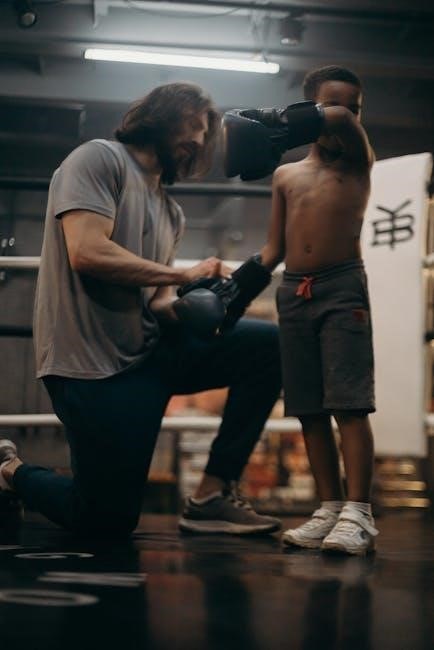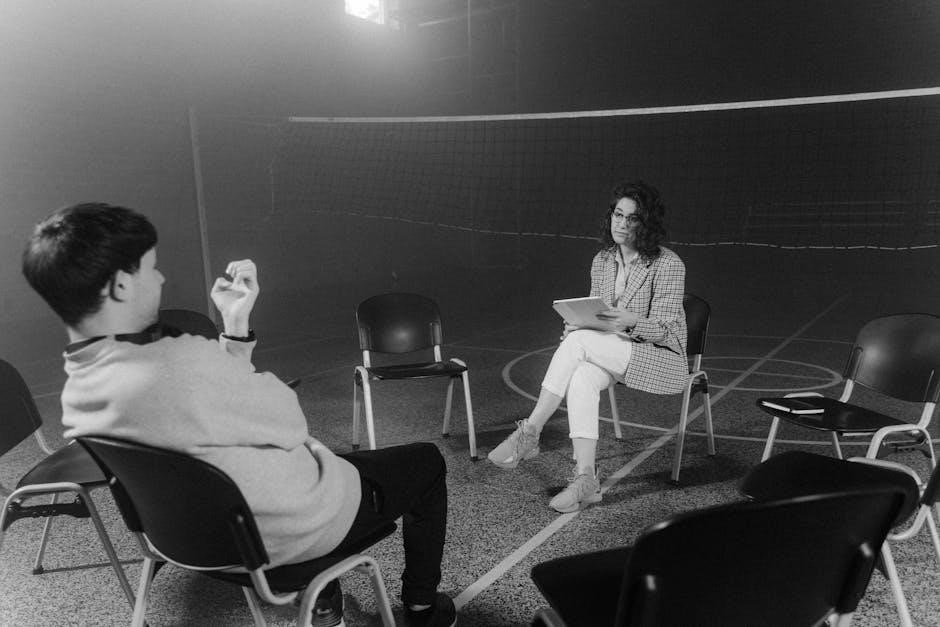An instructional coach plays a pivotal role in enhancing teacher effectiveness and student outcomes. Preparing for an interview requires a deep understanding of coaching strategies‚ classroom dynamics‚ and educational technologies. This guide provides insights into common questions‚ behavioral assessments‚ and scenario-based inquiries to help candidates showcase their expertise and passion for educational leadership.
Overview of the Role of an Instructional Coach
An instructional coach is a professional educator who works collaboratively with teachers to improve instructional strategies‚ student outcomes‚ and classroom practices. Their primary role involves providing professional development‚ mentoring‚ and coaching to educators. Instructional coaches analyze teaching methods‚ offer feedback‚ and help teachers integrate innovative technologies and research-based practices into their classrooms. They also assist in curriculum design‚ data analysis‚ and assessments to ensure alignment with educational goals. The role requires strong communication‚ leadership‚ and interpersonal skills‚ as well as the ability to foster a growth mindset among staff. By supporting teacher growth‚ instructional coaches play a crucial part in enhancing student learning and achieving school-wide objectives. Their expertise helps create a positive and effective educational environment.

Importance of Preparation for an Instructional Coach Interview
Preparation is key to excelling in an instructional coach interview. It demonstrates professionalism and a genuine interest in the role. Understanding the school’s mission‚ curriculum‚ and specific needs allows candidates to tailor their responses and show alignment with the organization’s goals. Researching common interview questions and practicing thoughtful answers ensures confidence and clarity during the conversation. Additionally‚ preparing examples of past coaching experiences highlights one’s expertise and problem-solving abilities. Developing a list of insightful questions to ask the interviewer showcases critical thinking and engagement. Proper preparation not only enhances credibility but also helps candidates stand out as the ideal fit for the position. By being well-prepared‚ instructional coach candidates can effectively communicate their qualifications and passion for fostering teacher growth and student success.

Common Interview Questions for Instructional Coaches
Common questions focus on coaching strategies‚ classroom management‚ and technology integration. Candidates should be ready to discuss their experience‚ philosophy‚ and approaches to teacher and student support.
Questions About Your Background and Experience
Interviewers often inquire about your educational background‚ teaching experience‚ and relevant professional development. Be prepared to discuss how your experiences have shaped your coaching approach. Highlight specific challenges you’ve overcome and successes achieved in prior roles. They may ask about your transition into coaching‚ your understanding of adult learning‚ and how you’ve supported teacher growth. Emphasize your ability to collaborate‚ communicate effectively‚ and adapt to diverse teaching styles. Provide concrete examples of professional development initiatives you’ve led or innovative strategies you’ve implemented. Share insights into how your background equips you to meet the school’s unique needs. Demonstrating a clear connection between your past experiences and the instructional coach role will showcase your readiness for the position. Use the STAR method to structure your responses‚ ensuring clarity and impact. Your background should illustrate your commitment to fostering educational excellence and your ability to drive meaningful change. This section is crucial for establishing your credibility and fit for the role. By aligning your experiences with the school’s goals‚ you can position yourself as an ideal candidate. Always maintain a focus on student-centered outcomes and teacher empowerment in your responses. This approach will help you stand out and demonstrate your value as an instructional coach. Your ability to articulate your journey and its relevance to coaching will leave a lasting impression on the interview panel. Ensure your answers are concise‚ specific‚ and reflective of your professional growth and aspirations in educational leadership. This will underscore your readiness to contribute effectively in the instructional coach role and support the school’s mission. By thoughtfully sharing your background and experience‚ you can build a strong foundation for the rest of the interview. This is your opportunity to highlight your unique strengths and how they align with the needs of the school and its educators. Seize this chance to narrate your professional story in a way that resonates with the interviewers and positions you as a capable and passionate instructional coach. Your background and experience are the cornerstone of your candidacy‚ so present them with confidence and clarity. This will not only demonstrate your qualifications but also your enthusiasm for the role and its potential impact. By doing so‚ you can create a compelling narrative that distinguishes you from other candidates and advances your candidacy. Your ability to connect your past experiences with the future goals of the school will be key to a successful interview. Make sure to emphasize your growth mindset‚ willingness to learn‚ and dedication to continuous improvement. These qualities are essential for an instructional coach and will resonate well with the interview panel. Ultimately‚ your background and experience should serve as a testament to your ability to lead‚ inspire‚ and support educators in achieving excellence. By sharing your story effectively‚ you can take a significant step toward securing the instructional coach position and making a meaningful impact on the school community. Your responses should be genuine‚ heartfelt‚ and aligned with the values of the institution. This will help you build rapport with the interviewers and demonstrate your potential to thrive in the role. Remember‚ your background and experience are your strongest assets‚ so use them wisely to convey your suitability for the position. This is your moment to shine and showcase your unique qualifications as an instructional coach. Make every word count and leave the interviewers with a lasting impression of your expertise and passion for education. Your ability to articulate your journey and its relevance to the role will be instrumental in your success. So‚ prepare thoroughly and present your background with confidence and enthusiasm. This will not only highlight your qualifications but also your readiness to embrace the challenges and opportunities of being an instructional coach. By doing so‚ you can position yourself as a strong contender for the position and take a significant step toward advancing your career in educational leadership.
Questions About Your Coaching Philosophy and Strategies
Your coaching philosophy and strategies are central to the interview. Be ready to articulate a clear‚ student-centered approach that emphasizes teacher empowerment and collaborative growth. Discuss how you foster a culture of continuous improvement and professional learning. Highlight strategies like co-planning‚ modeling‚ and providing actionable feedback. Share your beliefs about adult learning‚ such as the importance of differentiation and teacher autonomy. Explain how you align coaching with school goals and student needs. Emphasize your ability to adapt strategies to diverse teaching styles and classroom contexts. Provide examples of successful coaching cycles or professional development initiatives you’ve led. Illustrate how you measure the impact of your work and use data to inform decisions. Your philosophy should reflect a growth mindset‚ focusing on building teacher capacity and enhancing student outcomes. This is your opportunity to showcase your vision for instructional coaching and its potential to drive meaningful change. Ensure your strategies are practical‚ evidence-based‚ and aligned with educational best practices. By clearly communicating your philosophy and strategies‚ you can demonstrate your ability to inspire and support educators effectively. This will help you stand out as a transformative leader in education. Always connect your approach to the school’s mission and the broader goals of educational excellence. Your responses should highlight your creativity‚ flexibility‚ and commitment to fostering a collaborative learning environment. This will reinforce your credibility as a dedicated and innovative instructional coach.
Questions About Classroom Management and Teaching Techniques

Interviewers often inquire about your approach to classroom management and teaching techniques‚ seeking insights into how you support educators in creating effective learning environments. Be prepared to discuss strategies for fostering a positive classroom culture‚ managing challenging behaviors‚ and promoting student engagement. Share your perspectives on differentiated instruction‚ technology integration‚ and data-driven teaching methods; Highlight your ability to coach teachers in implementing research-based practices tailored to diverse student needs. Explain how you help educators develop lesson plans‚ assess student progress‚ and adjust instructional strategies. Emphasize your understanding of how classroom management impacts academic outcomes and your methods for encouraging collaboration and respect among students. Provide examples of successful techniques you’ve observed or implemented‚ and discuss how you adapt your recommendations to suit different teaching styles and classroom contexts. Your responses should demonstrate a commitment to fostering inclusive‚ engaging‚ and effective learning environments that support both teachers and students. This is your opportunity to showcase your practical knowledge and ability to address real-world classroom challenges. Ensure your answers align with current educational best practices and reflect a student-centered approach. By articulating clear‚ actionable strategies‚ you can demonstrate your value as a partner in improving teaching and learning. Your ability to connect classroom management with instructional techniques will highlight your expertise in driving student success. Always emphasize collaboration‚ adaptability‚ and a focus on measurable outcomes. This will reinforce your role as a supportive and innovative instructional coach.
Questions About Technology Integration in Education
Interviewers may ask how you integrate technology into teaching and learning‚ seeking insights into your strategies for enhancing education through digital tools. Discuss your experience with educational software‚ online platforms‚ and digital resources that support student engagement and teacher effectiveness. Highlight your ability to coach educators in using technology to differentiate instruction‚ assess student progress‚ and facilitate collaboration. Share examples of successful tech integration projects‚ such as blended learning models or interactive classroom tools. Emphasize your understanding of how technology can address diverse learning needs and improve academic outcomes. Address challenges like accessibility and equity‚ and explain how you help teachers overcome barriers to technology use. Showcase your knowledge of emerging trends‚ such as AI in education or gamification‚ and how they can be applied in the classroom. Demonstrate your commitment to preparing educators for the digital age and fostering innovative‚ technology-rich learning environments. Your responses should reflect a balance between practical application and forward-thinking strategies. By linking technology to pedagogical goals‚ you can illustrate your role in driving meaningful educational innovation. Always highlight collaboration‚ adaptability‚ and a focus on student-centered outcomes. This will underscore your expertise in leveraging technology to enhance teaching and learning. Your ability to connect digital tools with instructional strategies will position you as a forward-thinking instructional coach. Ensure your answers emphasize the transformative potential of technology in education while addressing real-world challenges and solutions. This will reinforce your value as a partner in modernizing classroom practices and improving student success.

Behavioral Interview Questions
Behavioral questions assess how you handle real-world scenarios‚ revealing your problem-solving skills and teaching philosophy. Expect inquiries about overcoming challenges‚ fostering collaboration‚ and driving instructional improvement. Be prepared to provide specific examples from your experience‚ demonstrating your ability to lead‚ adapt‚ and inspire. Highlight instances where you successfully coached teachers‚ resolved conflicts‚ or implemented innovative strategies. Use the STAR method (Situation‚ Task‚ Action‚ Result) to structure your responses‚ showcasing your critical thinking and leadership abilities. Your answers should reflect a commitment to student growth‚ teacher development‚ and continuous improvement in educational settings. This will help interviewers gauge your fit as an instructional coach.
Examples of Behavioral Questions for Instructional Coaches

Behavioral questions for instructional coaches often focus on real-world scenarios to assess problem-solving and leadership skills. Examples include:
- Describe a time you helped a teacher improve their instructional strategies. What steps did you take?
- Tell me about a challenging coaching situation. How did you resolve it?
- Share an example of how you supported a teacher in implementing a new educational technology.
- How did you handle a situation where a teacher was resistant to your coaching?
- Describe a professional development initiative you led. What was the outcome?
These questions allow interviewers to evaluate your approach to collaboration‚ conflict resolution‚ and fostering growth. Be prepared to provide specific‚ detailed examples from your experience‚ highlighting your problem-solving skills and commitment to teacher and student success. Your responses should demonstrate your ability to adapt to diverse classroom environments and contribute positively to school-wide goals. By sharing concrete examples‚ you can showcase your effectiveness as an instructional coach and your readiness to support educators in improving student outcomes. This will help interviewers assess your fit for the role and your potential to drive meaningful change in their school community. Always emphasize measurable results and the impact of your actions when answering behavioral questions.
How to Answer Behavioral Questions Effectively
To excel in answering behavioral questions‚ use the STAR method: Situation‚ Task‚ Action‚ Result. Be specific and provide concrete examples from your experience. Highlight your problem-solving skills‚ collaboration‚ and leadership. Emphasize the impact of your actions and the outcomes achieved. For example‚ describe how you supported a teacher in improving student engagement or resolved a conflict between colleagues. Show enthusiasm for education and your commitment to professional growth. Avoid vague answers and focus on demonstrating your adaptability and creativity. Practice your responses to common questions beforehand to ensure clarity and confidence. By aligning your answers with the school’s mission and values‚ you can showcase your fit for the role. Remember to highlight measurable results and the positive impact of your work. This approach will help you stand out as a strong candidate for the instructional coach position.

Scenario-Based Questions
Scenario-based questions present hypothetical teaching challenges‚ requiring candidates to demonstrate problem-solving and decision-making skills. Be prepared to discuss strategies for improving student engagement‚ addressing learning gaps‚ and fostering collaboration.
Common Scenario-Based Questions for Instructional Coaches
Scenario-based questions are designed to assess how you would handle real-world challenges in educational settings. Common examples include:
- How would you support a teacher struggling to engage students?
- Describe a strategy to address a learning gap in a classroom;
- How would you facilitate collaboration between teachers with differing instructional styles?
- What steps would you take to integrate technology into a traditional classroom?
- How would you coach a teacher to improve student behavior?
These questions evaluate your problem-solving skills‚ coaching strategies‚ and ability to apply theoretical knowledge to practical situations. Be prepared to provide specific‚ actionable responses that demonstrate your expertise and critical thinking abilities.
Best Practices for Responding to Scenario-Based Questions
When responding to scenario-based questions‚ it’s essential to demonstrate clear thinking and practical strategies. Use the STAR method: describe the Situation‚ outline the Task‚ explain your Actions‚ and share the Results. Be specific and provide examples from your experience. Highlight your ability to analyze problems‚ prioritize solutions‚ and implement effective coaching techniques. Show how you would collaborate with teachers‚ students‚ or administrators to address challenges. Emphasize your coaching philosophy and how it guides your decision-making. Maintain a calm and confident tone‚ showcasing your expertise and readiness to handle real-world scenarios. Avoid vague responses and ensure your answers reflect your ability to adapt to diverse educational settings. By structuring your replies thoughtfully‚ you can convey your problem-solving skills and commitment to improving educational outcomes.

Legal and Ethical Considerations
Instructional coaches must navigate confidentiality‚ FERPA compliance‚ and ethical decision-making. Understanding legal obligations ensures student and teacher data privacy‚ while ethical practices build trust and professionalism in coaching relationships.

Understanding Legal and Ethical Issues in Coaching
Instructional coaches must be well-versed in legal and ethical standards to ensure they navigate their role effectively. Confidentiality is paramount‚ as coaches often handle sensitive student and teacher information. FERPA regulations protect student records‚ and coaches must adhere to these guidelines to avoid unauthorized disclosure. Ethical dilemmas may arise in situations where confidentiality conflicts with the need to report concerns. Coaches should also be aware of professional boundaries‚ ensuring they maintain appropriate relationships with teachers and students. Additionally‚ understanding local‚ state‚ and federal education laws is crucial to comply with mandates and avoid legal repercussions. By upholding ethical practices and respecting legal frameworks‚ coaches can build trust and foster a positive‚ supportive educational environment. This knowledge is often assessed during interviews to ensure candidates are prepared to handle such issues responsibly.
How to Address Legal and Ethical Dilemmas in an Interview
When addressing legal and ethical dilemmas in an instructional coach interview‚ it’s essential to demonstrate a clear understanding of professional standards. Be prepared to provide specific examples of how you’ve navigated such situations in the past. For instance‚ discuss how you maintained confidentiality while addressing a sensitive issue or ensured compliance with laws like FERPA. Show that you can think critically by outlining the steps you took to resolve the dilemma‚ such as consulting with administrators or seeking professional development resources. Highlight your commitment to ethical practices‚ such as respecting teacher autonomy while providing constructive feedback. Avoid overly emotional or vague responses; instead‚ focus on practical solutions and your dedication to upholding trust and integrity in the educational environment. This approach will reassure the interviewer of your ability to handle challenging situations responsibly.

Questions to Ask the Interviewer
Asking thoughtful questions during an instructional coach interview demonstrates engagement and preparation. Inquire about the school’s specific challenges‚ opportunities for professional growth‚ and how success is measured. This shows your commitment to understanding the role and contributing effectively to the school community.
Key Questions to Ask During an Instructional Coach Interview
Asking the right questions during an instructional coach interview is crucial to understanding the role and expectations. Key questions to ask include: What are the biggest challenges facing the school or district that an instructional coach can help address? What resources and support systems are in place for teachers and coaches? How does the school approach professional development‚ and how will my success as a coach be measured? What opportunities are there for collaboration with other educators and leaders? How does the school foster a culture of continuous improvement and innovation? What are the short- and long-term goals for the instructional coaching program? These questions demonstrate your commitment to understanding the role and contributing effectively to the school community.
Why Asking Questions is Important in an Interview
Asking questions during an instructional coach interview is essential for demonstrating engagement‚ clarifying expectations‚ and showcasing your commitment to the role. It highlights your initiative and interest in understanding the school’s goals and challenges. By asking thoughtful questions‚ you gain insights into the school culture‚ available resources‚ and professional development opportunities. This helps you assess whether the role aligns with your expertise and aspirations. Additionally‚ it provides an opportunity to discuss your philosophy and strategies‚ reinforcing your suitability for the position. Asking questions not only benefits you but also demonstrates your proactive approach to contributing effectively to the school community.
Preparation and confidence are key to acing an instructional coach interview. Showcase your passion for education‚ demonstrate expertise‚ and follow up with a thank-you note to express enthusiasm.
Final Tips for Acing Your Instructional Coach Interview
To excel in your instructional coach interview‚ prepare thoroughly by researching the district’s goals and aligning your experiences with their vision. Showcase your passion for teacher growth and student success. Highlight specific strategies you’ve used to improve instruction and provide measurable outcomes. Demonstrate adaptability by sharing examples of how you’ve tailored coaching to meet diverse needs. Practice articulating your coaching philosophy clearly and confidently. Use the STAR method to structure your responses‚ ensuring clarity and conciseness. Ask insightful questions to show your commitment to collaboration. Follow up with a thank-you note‚ reinforcing your enthusiasm for the role. By presenting yourself as a reflective‚ student-centered leader‚ you’ll leave a lasting impression and position yourself as an ideal candidate.
Following Up After the Interview
Following up after your instructional coach interview is crucial to leave a positive impression. Send a thank-you note within 24 hours‚ expressing gratitude for the opportunity and reiterating your interest in the role. Personalize the message by referencing key discussion points or aligning your qualifications with the district’s needs. This demonstrates professionalism and enthusiasm. Additionally‚ consider sending any requested materials‚ such as lesson plans or coaching examples‚ promptly. If you haven’t heard back within a week‚ a polite follow-up email or call can inquire about the status of your application. This shows initiative and reinforces your commitment to the position. Remember‚ follow-up is not just a courtesy—it’s an opportunity to strengthen your candidacy and stay top of mind for the hiring team.
